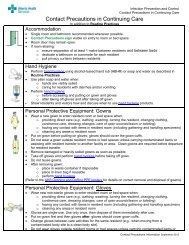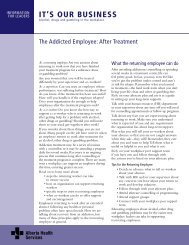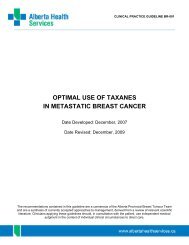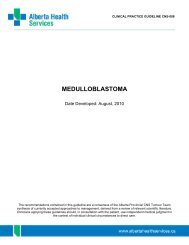Arsenic - Alberta Health Services
Arsenic - Alberta Health Services
Arsenic - Alberta Health Services
Create successful ePaper yourself
Turn your PDF publications into a flip-book with our unique Google optimized e-Paper software.
FAQ<br />
<strong>Arsenic</strong><br />
What is arsenic?<br />
<strong>Arsenic</strong> is a naturally occurring element that is not essential to<br />
our bodies. It can be found in the environment in organic and<br />
inorganic forms. When metallic arsenic comes into contact with<br />
water it can become arsine gas.<br />
What are some sources of arsenic?<br />
<strong>Arsenic</strong> is found in the air, water, and soil naturally but also a<br />
result of mining, manufacturing, and other industrial practices.<br />
It can be found in some foods, including seafood.<br />
<strong>Arsenic</strong> has also been found in some folk remedies, veterinary<br />
products, and in homeopathic and naturopathic products.<br />
How do arsenic exposures occur?<br />
<strong>Arsenic</strong> can be absorbed by the lungs either by breathing air that<br />
has high levels of arsenic or by inhaling the actual gas form.<br />
<strong>Arsenic</strong> can be absorbed through liquid exposures to large skin<br />
areas and by swallowing arsenic based products or contaminated<br />
food and water. Jobs and hobbies that involve arsenic in their<br />
production process can result in exposures if proper safety<br />
equipment is not used or if the work site is not properly ventilated.<br />
Such jobs include; glass manufacturing, metal refining, smelting,<br />
welding and other metal-work, along with those that involve<br />
herbicides, pesticides and insecticides.<br />
Military personnel may be exposed through chemical weapons and<br />
those with hobbies that include glass or metal work may be at risk.<br />
How can arsenic affect my health?<br />
<strong>Arsenic</strong> itself is a poison to every cell in the body. The expected<br />
effects depend on the type of arsenic, the amount in the<br />
exposure, and the length of time one was exposed to arsenic.<br />
Sudden and large inhalations of arsenic contaminated air or dust<br />
particles can cause irritation to the throat and lungs. Coughing,<br />
difficulty breathing, and chest pain may be noted.<br />
If arsenic is swallowed in large amounts, abdominal pain, garlicky<br />
smelling breath, nausea, bloody vomiting, and large amounts<br />
of watery diarrhea may occur. Kidney failure, liver failure, heart<br />
failure and shock can all result from the loss of fluids due to the<br />
vomiting and diarrhea, and may also be due to the direct cell<br />
poisoning by the arsenic.<br />
Weakness, coma, and seizures may be delayed by a couple of<br />
days, and loss of balance, decreased muscle strength and a<br />
sensation of pins and needles to the hands and feet may be seen<br />
a few days to weeks after exposure. A reduction in the number of<br />
red blood cells, white blood cells, and platelets can occur up to<br />
two weeks later.<br />
Skin exposure effects include rash, irritation, burns, skin-peeling,<br />
and the development of white lines across the nails. These<br />
effects may also be delayed one to six weeks.<br />
Long term or chronic exposures to smaller amounts of arsenic<br />
also affects all of the body systems. There can be mental<br />
slowness, tiredness, coma, high blood pressure, decreased<br />
blood flow to the hands and feet, and irritation to the lungs and<br />
stomach. Liver damage, bladder and kidney damage, numbness<br />
and tingling to the hands and feet, decreased balance and<br />
muscle wasting may also be experienced. <strong>Arsenic</strong> is associated<br />
with skin changes such as patchy changes in skin colour, thick<br />
horny growths, and increased sensitivity. <strong>Arsenic</strong> is a well known<br />
cancer causing agent and has been linked to many cancers<br />
including those of the skin, the bone marrow, the liver, the<br />
bladder, the kidney, the prostate, and the lung.<br />
Is there a medical test that can determine<br />
if I have been exposed to arsenic?<br />
Yes. In situations where the history and symptoms fit with arsenic<br />
exposures a medical doctor can order specific blood and urine<br />
tests to be collected and sent to an appropriate laboratory. Hair<br />
and fingernail samples are not useful in determining toxicity.<br />
Does an elevated level of arsenic always<br />
mean that I have arsenic poisoning?<br />
No. Because arsenic is found in all parts of our environment,<br />
we will all have detectable arsenic levels. The need to treat<br />
an arsenic level depends on the history of exposure and the<br />
patient’s symptoms.<br />
1-800-332-1414 www.padis.ca
FAQ<br />
<strong>Arsenic</strong> cont’d<br />
What is the treatment for arsenic<br />
exposures?<br />
The main treatment is to remove the source of the arsenic<br />
and prevent re-exposure. This may involve use of proper<br />
protective equipment on the job or with hobbies. It may<br />
involve discontinuation of folk remedies and supplements.<br />
Some patients, depending on test results, arsenic levels, and<br />
symptoms, may require medications called chelators (kee-laytors),<br />
to help remove some of the arsenic from their bodies.<br />
What are chelators and when would they<br />
be used?<br />
Chelators attach to some metals and remove them from the<br />
body, but they also remove good minerals. Chelators can cause<br />
damage to other organs and can cause life threatening allergic<br />
reactions. Because of these dangers it is important that patients<br />
be assessed by a medical doctor and that appropriate tests are<br />
performed at an appropriate laboratory.<br />
This decision to chelate should be made by a medical doctor<br />
after considering the history of exposure, the test results, and the<br />
patient’s symptoms.<br />
Does arsenic cause cancer?<br />
Not all types and forms of arsenic cause cancer. Inorganic<br />
arsenic, which can be found in smelting and semiconductor<br />
manufacturing, is a known cancer causing agent.<br />
Where can I get more information?<br />
If you have questions about arsenic call PADIS (Poison and Drug<br />
Information Service) at 1-800-332-1414. Information Specialists<br />
are available 24/7 to help answer your questions.<br />
1-800-332-1414 www.padis.ca
















